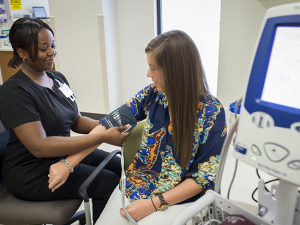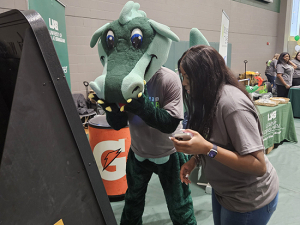 UAB will offer remote-work options and flexible scheduling to select Workgroup A employees in a new Alternate Work Options program following a successful pilot program.
UAB will offer remote-work options and flexible scheduling to select Workgroup A employees in a new Alternate Work Options program following a successful pilot program.
The pilot program affirmed, with data and feedback, some employee duties can be completed off site without a change to the experience of our students, faculty, staff and the community we serve, says UAB Chief Human Resource Officer Janet May.
“We were able to demonstrate flexible work options can help provide work-life balance, improve our ability to recruit and retain high-caliber employees, and maintain excellent service for those who count on us,” May said.
New alternate work options
As a result, Workgroup A employees whose positions do not require a daily on-site presence can be considered for hybrid or fully remote work through UAB’s new Alternate Work Options program. Check your workgroup assignment.
- Employees enrolled in the pilot program are eligible to continue to participate as of 1, with supervisor and unit/school/college approval, as well as completion of required forms and training by Aug. 31, 2022.
- Employees who were not enrolled in the pilot will be eligible to participate in an alternate work arrangement on or after Sept. 1, subject to supervisor and unit/school/college approval and completion of required forms and training.
Remote work options fall into three categories: hybrid or partially remote, in-state fully remote and out-of-state fully remote. Requirements and limitations for remote work are listed in these FAQs.
Employees in Workgroup A are also eligible to request a Flexible Work Schedule allowing a compressed or non-traditional work schedule (i.e., 4 or 4.5 days of work per week) provided the total number of hours worked in a week is at least 40.
“This option will allow more Workgroup A employees to participate in the Alternate Work Options program who may not otherwise be eligible or approved for hybrid or remote opportunities,” May said. “If approved by a supervisor, eligible employees can participate in multiple options. For example, a remote or hybrid employee can also be considered for a Flexible Work Schedule.”
President Ray Watts says the options this program offers employees will not slow the unprecedented positive momentum the institution has built in recent years.
“At UAB, our people are the most important resource for our success and service,” Watts said. “I am pleased that the pilot program demonstrated our employees can enhance work-life balance and maintain excellence across our mission as we evolve and offer flexibility to our workforce.”
Important caveats
In order to uphold the university’s mission and shared values — including stewardship, accountability and excellence — not all university employees are eligible to participate in the Alternate Work Options program, and supervisors are not required to approve all requests.
“For this to work,” May said, “employees must remain committed to UAB’s mission, and units/schools/colleges’ staffing decisions must support continued growth and success across mission pillars with an unwavering commitment to our students, Birmingham, Alabama and all who depend on us.”
HR representatives can answer questions and guide supervisors about the program, but there are some general limitations:
- Many roles require a face-to-face physical presence to best provide services to students, colleagues, patients and others; those positions will not be approved for remote or hybrid schedules.
- During the pilot program up to 25% of an area’s workforce could be classified as hybrid and 5 percent to be fully remote.
- As of Aug. 1, restrictions on the percentage of Workgroup A employees who can be classified as hybrid are lifted.
- The percentage of fully remote employees each VP unit or school/college can maintain has increased from 5% to 10% (no more than 5% can be out-of-state fully remote).
- Leadership positions at executive administrator/executive director and above are ineligible for full-time off-site work.
- Approvals of alternate work arrangements are subject to the ongoing business needs of the unit, and individual performance is subject to review annually, at a minimum.
Learn more online about UAB’s requirements and processes to determine eligibility and approval for alternate work options, as well as explore resources for working in a hybrid/remote environment.
“I want to thank everyone who participated in, supported or provided feedback about the pilot program that helped us get to this point, including the University of Alabama System Office and Board of Trustees for their unwavering support,” Watts said. “I also offer a very special thanks to our colleagues in Human Resources, Financial Affairs, Compliance and Risk Assurance and Information Technology for their diligent work toward this important step.”







































